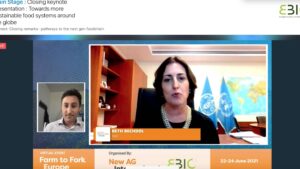For the past five years, the Directorate General for Agriculture and Rural Development (DG AGRI) of the European Commission has organised the EU Agricultural Outlook Conference, a gathering to analyse the challenges and perspectives of the agri-food sector in Europe and its evolution. The last edition took place in Brussels, from the 10 to 11 December 2019, with the motto “Sustainability from Farm to Fork”[1].
The first reflection I want to share with you is that, from my point of view, the title of the conference clearly captured the current discussions at European level. As you may have noticed, the political guidelines announced by the President of the Commission, Ms. Ursula von der Leyen, include sustainability as the cornerstone of the European development[2]. As part of this commitment, she announced a European Green Deal and a new Farm to Fork strategy, to name only a couple of measures that will impact agriculture.

The second idea that comes to my mind is the very interesting point in which the conference took place. On one hand, the Common Agricultural Policy (CAP) discussion from the previous mandate is confronted now with the reduction of the budget (even more important due to Brexit) and the push for more environmental requirements requested by the European Parliament. On the other hand, the European Green Deal is the most ambitious project of this Commission, trying to make Europe the first climate-neutral continent. To do so, the Commission will look at all possible elements to reduce greenhouse gas emissions, protect biodiversity or reduce soil and water pollution, amongst others. Finally, the new Farm to Fork strategy (expected by 2030) will address each and every step of the food chain, from production to consumption, in order to contribute to the UN Sustainability Goals.
Content wise, the conference touched upon a wide range of topics, such as the role of science and research, solutions to increase agricultural sustainability, how to reduce (food) waste, sustainable trade, social demands, food prices and the outlook market for different crops and productions and included many speakers with very different backgrounds representing EU institutions, governments and international organisations, agri-food chain associations, market experts, academics, think tanks and civil society.
As rightly pointed out by the organizers, the real challenge is how to combine a more sustainable EU agri-food production (for farmers and for the environment) with higher societal demands (both in terms of quality and price). In other words, how to maintain farmers’ income with increased food quality and environmental requirements, less economic support and low food prices. The answer to this question was provided on day 2 of the conference, when the Commission mentioned that only technology can respond to rising societal demands without increasing food prices.
It is in this context where my third reflection comes in, about the use of technology in agriculture, and specifically about the role of plant breeding and other seed innovations. Companies active in the plant breeding and seed production sector are amongst the most innovative in Europe and meet the challenging and ever-evolving needs of farmers and the rest of the agri-food chain, including consumer preferences and policy objectives.
Innovative solutions such as modern varieties ensure farmers to maintain high stable yields and quality production while at the same time reducing the environmental impact and addressing biodiversity (as clearly indicated in the general principles of Integrated Pest Management in the Sustainable Use Directive)[3].
I believe that the European seed sector plays a key role to meet the global challenges such us mitigating climate change, feeding a growing world population and supporting resource-efficient farming systems. To do so, breeding companies have always been at the forefront of innovation and they strive to continue this way[4].
[tweetshare tweet=”I believe that the European seed sector plays a key role to meet the global challenges such us mitigating climate change, feeding a growing world population and supporting resource-efficient farming systems.” username=”EuropeanSeed”]
This brings me to the last point for reflection about the Conference. On day 1, plant breeding innovation was presented as one of the ways to achieve a more sustainable production. However, today, European scientists and breeders are not able to use the latest plant breeding methods to meet challenges ahead (and unfortunately, it seems that this will be the case for the next years if nothing changes).
We all understand that societal acceptance of new technologies and developments is a key enabling factor and that it differs from one person to another. Therefore, in order to provide an adequate reply to the different sensitivities within the society to remain innovate, the seed industry relies on the principle of freedom of choice. By this mean, a proper toolbox which includes all plant breeding innovations will allow us to develop the products that farmers, consumers and society as a whole demand.
From my point of view, DG AGRI has once again made an excellent Conference. Congratulations.
- https://ec.europa.eu/info/events/2019-eu-agricultural-outlook-conference-2019-dec-10_en
- https://ec.europa.eu/commission/sites/beta-political/files/political-guidelines-next-commission_en.pdf
- https://eur-lex.europa.eu/legal-content/EN/TXT/PDF/?uri=CELEX:32009L0128&from=EN
- https://www.euroseeds.eu/app/uploads/2020/01/20.0007-Euroseeds-seed-sector-brochure.pdf
César Gonzalez is Manager Public Affairs at Euroseeds












